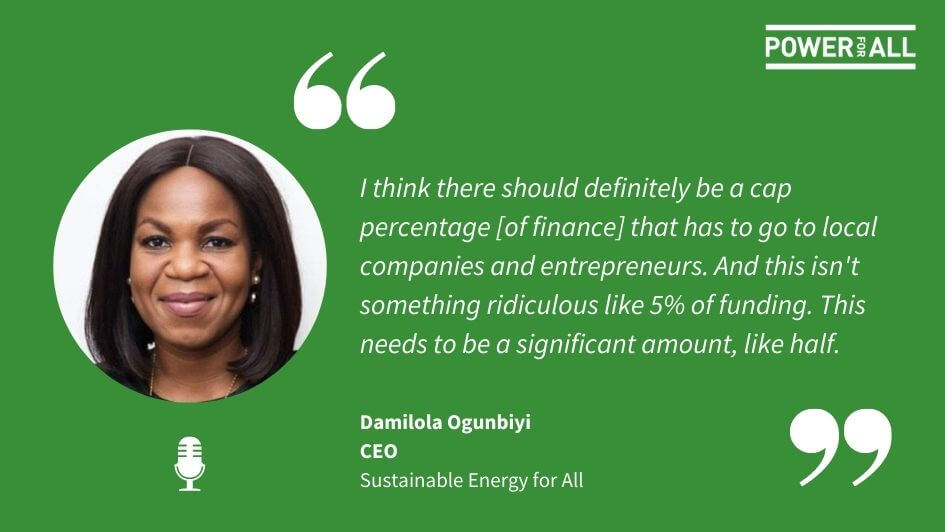In this special episode, part of the "Lessons from the Frontline" series from Innovate UK programme Energy Catalyst, we speak with Damilola Ogunbiyi, CEO of SEforALL and the United Nations Secretary General Special Representative for SDG7, about financing for energy access, challenges the market is facing and innovations that offer hope for the future. To learn more about Energy Catalyst, which supports innovators working in Africa and Asia to achieve universal energy access, visit their website. Below are key takeaways from our conversation with Ms. Ogunbiyi.
We’re further behind that we think
A new report from SEforALL on Energizing Finance looked at not just people working on energy access, but on energy as a whole. This includes everything from grid-scale renewables right down to solar home systems. And the truth of the matter is that there just isn’t enough money coming into the system, either from DFIs or the investors, or anyone that needs to be providing funding. From 20 high impact countries in Asia and Africa, it was found that there was about US$ 43.6 billion going into the sector, but only US$ 16 billion going into residential, and even more worryingly, only US$ 3.3 billion going to African renewables, of which only 1 or 1.5 percent going to pure access mini-grids. This shows just how big the gap is.
It’s not just about barriers to accessing the money, but also about people not understanding how critical it is to have funding available for this key task, because to achieve SDG7 by 2030, it’s critical to address this.
So, how do we address this gap? One key factor is that people have to first recognise how big the challenge is. Local companies and local entrepreneurs play a key role in bridging this gap, but need the instruments that can be directed to them. These aren’t companies that have raised series A or series B funding, but they’re doing critical work, especially in COVID times, so they need funds directed to them. And overall, this funding needs to significantly increase.
The other key factor is local currency that comes with its own risks and we need to develop instruments to not only make sure local currency is available, but also hedge that against foreign exchange risks. There should be a cap percentage that should go to local companies and entrepreneurs. And not just something ridiculous like 5 percent of funding. It needs to be a significant amount, like half. Of course, we need both foreign and international, but what COVID has shown us was that it was the local guys who stayed back and came up with innovative ways like voucher systems and services like powering health care.
Global access conversations
At the country level, we need to understand energy access, as it relates to electrification and clean cooking, has to be on the agenda. A lot of countries in the G20 that we’ve been speaking with haven’t focused on decentralized energy at all, or clean cooking, and are only looking at large-scale, grid-scale renewables, which is important for the energy transition, but we need to really push the energy access point of view and ensure we can achieve this. It’s not about picking one or two things, it’s about working together to make it happen. The energy transition cannot happen without energy access. We need to show people how they can actually achieve access in a low carbon way as part of the energy transition plans instead of having that as two separate things.
Coming out of COVID, we know that there are a million problems that people are trying to solve for with limited resources. But energy access really does save lives and we need a much greater focus on that. It’s more than just the solar maps market, it’s more in terms of how we get energy for economic growth, providing clean energy to health care facilities, all of which is critical for the economy. And then there’s jobs. The numbers don’t lie. You can create 3.5 more jobs from renewables than you can from fossil fuel equivalents and you can get US$ 0.93 GDP to a dollar if you invest in clean energy. Sometimes climate isn’t the top priority, but you can do climate by default by making sure that the needs are actually taken care of.
Aside from COP26, there’s also a high level dialogue on energy that the UN is having in 2021 for the first time in 40 years. This time we need to be speaking about speed and scale for everybody. We cannot take away the economic development conversation, especially for developing countries. It has to be both, and we cannot keep going on at the minimum level of access anymore. That is not fair, and it doesn’t give a lot of these countries the impact they actually need.
Energy financing for impact
In terms of financing, big organizations need to be making bigger commitments. SEforALL has this new campaign on cooling that explains what different countries are doing, how we can manage our energy needs through efficiency, and the different, better, types of cooling that we can implement. In addition, there’s work we’re doing on health care, looking at what the needs are for standard health care facilities in Africa and how they differ, and what needs to be done to improve it. We’re working with the Nigerian government on 100 primary health care facilities that they’re about to power, and working with Sierra Leone as well. What underpins all of this is data.
In terms of integrated energy planning, we’re going to have COVID vaccination distribution plans, because it’s important to understand what the cold chain and energy needs will be for the developing world.
